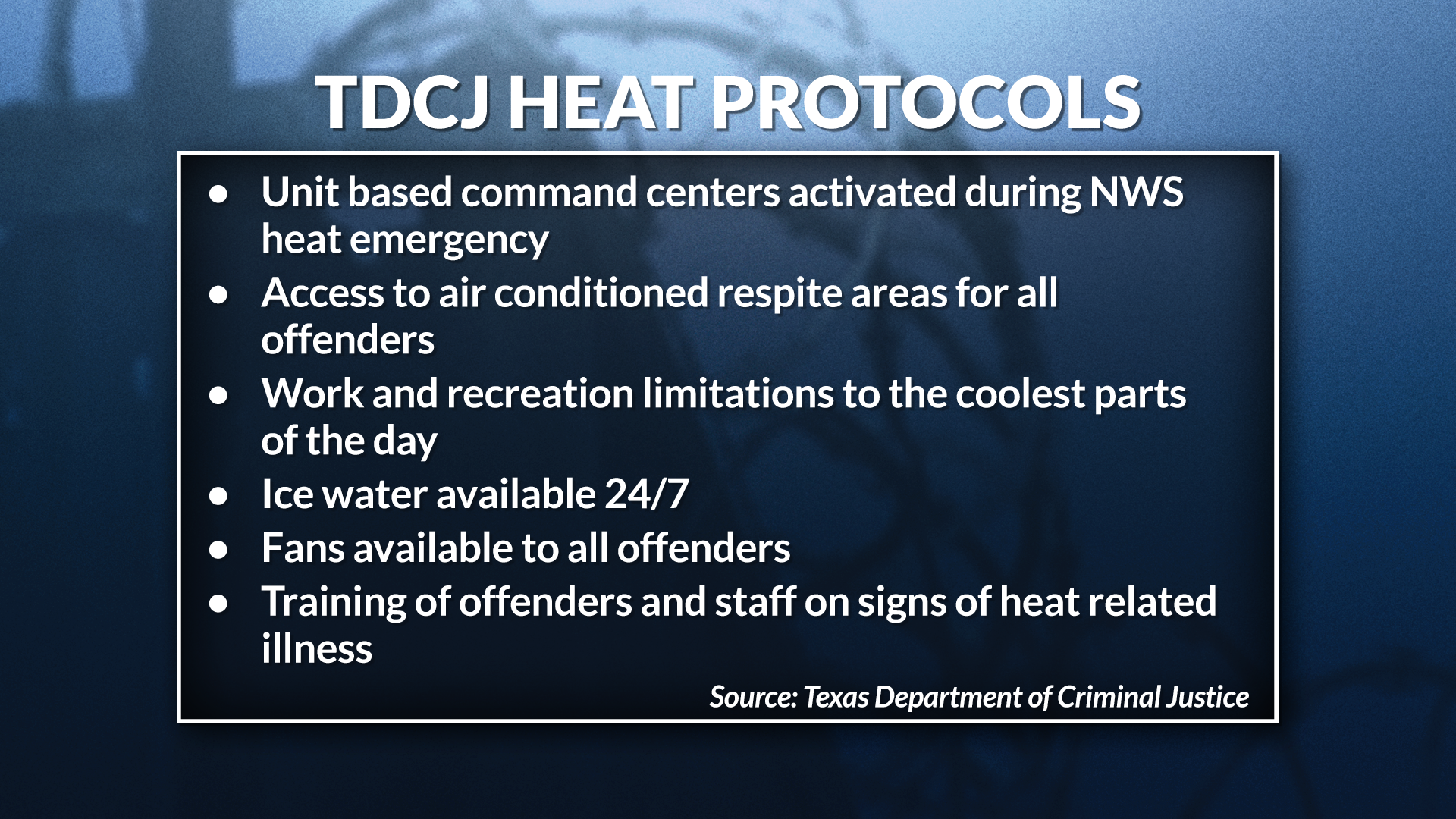AUSTIN (Nexstar) — No one likes being hot under the collar — including inmates in Texas prisons — but should the state be responsible for keeping prisons cool during the hot Texas summer?
Former inmates and families of people behind bars are urging the state to more closely control temperatures inside prison facilities.
“The summer of 2011 was horrible, I’ll never forget that,” Jose Flores said.
Flores was locked up for aggravated robbery and charges relating to drug and alcohol abuse. He spent almost 13 years in Texas prisons, spanning from 1999 to 2012. One of the constants he remembers is the heat.
“When it’s a hot day you think about taking a cold shower and you’re sitting under just hot water and sweating. And then getting out and while you’re putting your new fresh clothes back on you’re already sweating.”
At the Texas Prisons Air-Conditioning Advocates legislative day at the Capitol, supporters of prison reform invited the public to experience conditions similar to what inmates and corrections officers face when it gets hot.
Lawmakers in both chambers have filed companion legislation to require the Texas Department of Criminal Justice to ensure that the temperature in each facility operated by the department is maintained at not less than 65 degrees Fahrenheit or more than 85 degrees Fahrenheit.
State Senator José Menéndez filed Senate Bill 321 in the upper chamber.
“We are human beings,” the San Antonio Democrat said. “They’re paying their debt to society, but that doesn’t mean we treat them like trash.”
State Rep. Terry Canales (D-Brownsville) issued a statement after filing House Bill 936 in the lower chamber.
“The State of Texas has been facing years of litigation concerning heat-related illnesses and claims of unusual punishment up to and including deaths in our largely un-air conditioned Texas prisons. There is a steep price tag related to heat-related illnesses, including healthcare costs for guards and inmates, persistent prison guard under-staffing resulting from high staff turnover, the effect of extreme heat on inmate behavior, and the costs the state is bearing from constant litigation. It is imperative that state lawmakers recognize that cooling and heating our prisons is actually more cost efficient than dealing with these heat-related impacts. When you consider the high turnover rate and the under-staffing problems, coupled with inmates cooking at a temperature of over 100 degrees, you have a recipe for disaster. Regardless of the facts, fixing this issue is just the right thing to do.”
Correctional Employees unions in the state support the legislation, which they said affects officers as well as offenders.
“That A/C will go all the way around, not just for inmates but also for the officers and staff alike,” said Officer Cheri Siegelin, president of the Texas Correctional Employees union.
State Rep. James White, an East Texas Republican, said it would be unrealistic to expect TDCJ to make changes without lawmakers providing more resources.
White, who serves as chair of the House Corrections Committee, said: “If we were to pass a measure to keep the units between 65 and 85, if you do nothing else, there will be a day I will get a call and the unit’s temperature will fall under 65 or beyond 85, I know this.”
“Keeping a spreadsheet is not going to have any impact,” he explained.
“We have not given the agency the resources and the direction to address this issue in an effective manner,” White said.
TDCJ indicated that it established new heat-related protocols in 2018, including heat emergency command centers, and a plan to put heat-sensitive offenders in air-conditioned areas.
“The Texas Department of Criminal Justice has been and continues to be committed to the safety and well-being of all offenders and our staff during extreme heat conditions,” the agency’s communications director, Jeremy Desel, wrote in an email for this report.
“Last year, the agency established new heat protocols which included heat emergency command centers on the unit level and the establishment of 26 heat sensitive offender classifications that are based on medical factors,” wrote Desel. “The agency is also making security changes at a number of units to make more air conditioned beds available.”
There has not been a heat-related death in a TDCJ facility since 2012, according to Desel. Last year — despite a higher than normal level of heat warning days — the number of offender heat-related illnesses was flat from the year before and down by more than half from 2013.

The agency also provided a list of the highlights of its heat protocols, which include making ice water available 24/7, making fans available to all offenders, and limiting work and recreation to cooler times of day.
TDCJ also provides specific heat-related training to offenders and staff.
Canales’ bill is scheduled for a hearing in the House Corrections Committee on March 21. Menéndez’s bill was referred to the Senate Criminal Justice Committee.
Flores is hopeful the state will find a resolution to prevent dangerous conditions in the future.
“I’m hopeful that they’re going to follow through.”



























